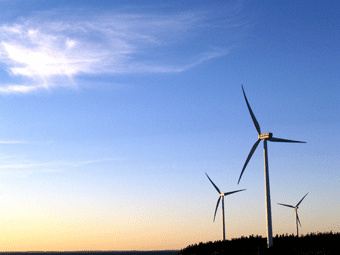Wind Energy in Nova Scotia

Wind energy is one of the fastest growing energy sources in the world. Here’s why it makes good sense for Nova Scotia:
It’s clean
- Wind energy does not result in emissions that cause the health problems associated with fossil fuels such as sulfur dioxide and nitrous oxide or mercury or the environmental problems that come from carbon dioxide - one of the greenhouse gases that contribute to climate change.
- Every megawatt of wind energy can reduce our greenhouse gas emissions by as much as 2,500 tonnes per year—enough clean energy to power 350–400 Nova Scotian homes.
- Every megawatt of wind energy we come closer to meet our requirements to reduce greenhouse gases.
It’s domestic
- Wind energy creates local investment through land leases, municipal taxes, site preparation, construction, and operations and maintenance—and it can create a demand for local labour.
It's the law
- Nova Scotia has legislated goals in the Environmental Goals and Climate Change Reduction Act (PDF) to get off coal and have 80% of electricity generated with renewables by 2030 – and to reach net zero by 2050.
- To ensure a more diverse energy mix, Nova Scotia Power and the municipal electric utilities must meet the requirements in the Renewable Electricity Regulations.
- Federal regulations require coal-based electricity generation to end by 2030.
It’s renewable
- Wind energy does not use up natural resources. Capturing some of it to drive a turbine to transform the energy of wind into the energy of electricity makes no significant impact on the amount available, and thus wind is infinitely renewable.
It’s affordable
- The cost of commercial-scale, competitively-sourced wind energy has already been found to be competitive with traditional sources of energy, such as fossil fuels when those prices spike on global markets, and is less expensive than most other forms of renewable energy
- The fuel for wind energy projects is free, and in Nova Scotia is subject to long-term fixed-price contracts or capital work orders resulting in renewable energy prices that stay the same for decades.
Wind energy also presents some challenges. Wind turbines do create noise and may not be appropriate for all locations. To ensure wind projects are properly developed and managed, sound levels and other issues are the subject of regulation by a number of authorities. Click here for more information on the noted effects of wind turbines. Click here for more information on how wind energy is being regulated.